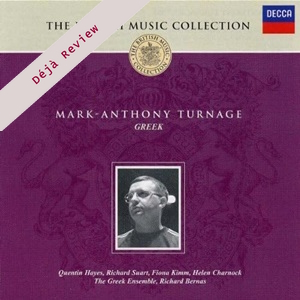
Déjà Review: these reviews were first published in February 2003 and the recordings are still available.
Mark-Anthony Turnage (b. 1960)
Greek – an opera (1987-88)
Libretto by Steven Berkoff from his play of the same title, adapted by Mark-Anthony Turnage and Jonathan Moore
Cast listed after review
The Greek Ensemble/Richard Bernas
rec. 1992, Henry Wood Hall, London. DDD
The British Music Collection series
Decca 473 426-2 [78]
On its original release on the Argo label, this must surely have been the first classical disc ever to have a parental warning sticker on the cover. Well, the sticker has gone, but the language, both verbal and musical, remains as powerful and shocking as before. In fact, it is at times something of a misnomer to call this a classical piece, as it relies for its effect on ‘crossover’ techniques, such as pounding rock rhythms, music-hall, popular tunes, football chants, jazz and blues. The impact is also fractionally lessened away from the theatre, where the visual stylisation, particularly regarding the movement of the actors, is so important. Nevertheless, on disc, one can concentrate on the words and, more particularly, the astonishing variety and range of sounds Turnage conjures up from his chamber orchestra.
Despite persistent rumours about Berkoff’s dismay at the operatic treatment of his play (particularly the Thatcherite ‘politicising’ of the content), the listener is left in no doubt that Greek is more than just a product of a disaffected 1980s Britain. This is a true piece of music drama, admittedly brutal and grim, but a piece with enough lasting quality to ensure a place in the repertoire. Indeed, as a staging at the 2001 Huddersfield Contemporary Music Festival (to be revived this year) proved, Turnage has given Berkoff’s scabrous reworking of the Oedipus myth an extra layer of subtlety. His orchestra, as in all the great psychological operas from Tristan onwards, goes well beyond the expletives on stage to reveal the hidden truth of the character’s motives and emotions. With astonishing virtuosity of scoring, an ensemble of 21 players, most of them called upon at one time or another to double on percussion, conjures a world of restless fury, pent-up anger and bristling tension that is almost cinematic in its matching of colour to mood. Take the Prologue to Act 2, where Eddy(pus) and his wife, though now prosperous, are reminded that all is not well and plague still stalks the lane. Where the singers declaim in a mixture of parlando and sheer mob bellowing, the orchestra manages, in two brief minutes, to give us a much subtler but even more menacing picture of the horrific events unfolding before us. The instrumental effects also drive home, in an almost Brechtian way, the fact that the plague is a metaphor for something more contemporary, namely racism, gang warfare and mass unemployment. This all points to a satisfying aural experience, particularly with such an immediate recording balance.
Without the visual staging, the ‘singing’ is to be enjoyed less. The impeccably trained opera singers struggle with Berkoff’s visceral East End slang, and much of the sprechtstimme is unconvincing without the body language to accompany it. Still, this is as authoritative as it gets, with the entire cast on this recording having performed in the premiere (at least two are to appear in the London Sinfonietta revival). Coming off the back of that successful first staging (originally conducted by Siân Edwards) all are well inside their characters, with Helen Charnock’s Mum being particularly moving. The quality of the orchestral playing is beyond criticism.
This new re-issue is cheap and comes once again on one very well-filled single disc. Full text is included, though it is doubtful you will need it, given the superb diction and up-front recording quality. Despite Turnage’s expressed ambivalence towards operatic form, he has matured considerably in this genre, as the success of The Silver Tassie showed. To hear the young composer’s first, highly energised essay in the form is fascinating indeed, and whether it is uncomfortable or not, it remains essential listening for lovers of contemporary music theatre.
Tony Haywood
See also review by Gary Higginson (March 2003)
Buying this recording via a link below generates revenue for MWI and helps us keep free access to the site


Cast:
Eddy – Quentin Hayes (baritone)
Dad/Café Manager/Chief of Police – Richard Stuart (baritone)
Wife/Doreen/Waitress/Sphinx 2 – Fiona Kimm (mezzo)
Mum/Waitress/Sphinx 1 – Helen Charnock (soprano)

















